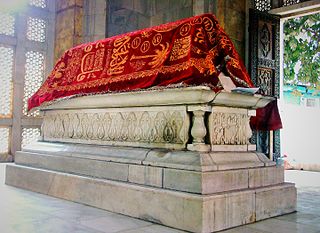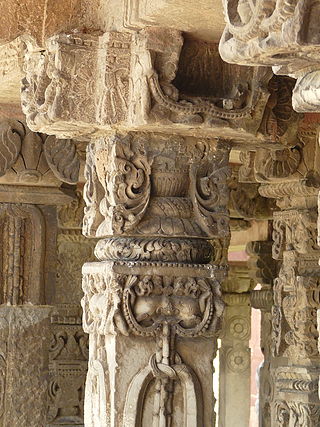Ghauri, Ghori, Ghouri, or Ghuri may refer to:
Ghauri, Ghori, Ghouri, or Ghuri may refer to:

The Delhi Sultanate or the Sultanate of Delhi was a late medieval empire primarily based in Delhi that stretched over large parts of the Indian subcontinent, for 320 years (1206–1526). Following the invasion of South Asia by the Ghurid dynasty, five dynasties ruled over the Delhi Sultanate sequentially: the Mamluk dynasty (1206–1290), the Khalji dynasty (1290–1320), the Tughlaq dynasty (1320–1414), the Sayyid dynasty (1414–1451), and the Lodi dynasty (1451–1526). It covered large swaths of territory in modern-day India, Pakistan, and Bangladesh as well as some parts of southern Nepal.

Mu'izz al-Din Muhammad ibn Sam, also known as Muhammad of Ghor or Muhammad Ghori, was a ruler from the Ghurid dynasty based in the Ghor region of what is today central Afghanistan who ruled from 1173 to 1206. Muhammad and his elder brother Ghiyath al-Din Muhammad ruled in a dyarchy until the latter's death in 1203. Ghiyath al-Din, the senior partner, governed the western Ghurid regions from his capital at Firozkoh whereas Muhammad extended Ghurid rule eastwards, laying the foundation of Islamic rule in South Asia, which lasted after him for nearly half a millennium under evolving Muslim dynasties.

Qutb ud-Din Aibak was a general of the Ghurid emperor Muhammad Ghori. He was in charge of the Ghurid territories in northern India, and after Muhammad Ghori's assassination in 1206, he established the Delhi Sultanate (1206–1526), and started the Mamluk dynasty, which would rule the Sultanate until 1290.

The Mamluk dynasty, also known as Slave dynasty, was a dynasty which ruled the Delhi Sultanate from 1206 to 1290. It was the first of five largely unrelated dynasties to rule the Delhi Sultanate until 1526. Before the establishment of the Mamluk dynasty, Qutb al-Din Aibak's tenure as a Ghurid dynasty administrator lasted from 1192 to 1206, a period during which he led forays into the Gangetic plain and established control over some of the new areas.

The Ghiljī also spelled Khilji, Khalji, or Ghilzai and Ghilzay (غلزی), are one of the largest Pashtun tribes. Their traditional homeland is Ghazni and Qalati Ghilji in Afghanistan but they have also settled in other regions throughout the Afghanistan-Pakistan Pashtun belt. The modern nomadic Kochi people are predominantly made up of Ghilji tribes. The Ghilji make up around 20–25% of Afghanistan's total population.
The Ghurid dynasty was a Persianate dynasty of presumably eastern Iranian Tajik origin, which ruled from the 8th-century in the region of Ghor, and became an Empire from 1175 to 1215. The Ghurids were centered in the hills of the Ghor region in the present-day central Afghanistan, where they initially started out as local chiefs. They gradually converted to Sunni Islam after the conquest of Ghor by the Ghaznavid ruler Mahmud of Ghazni in 1011. The Ghurids eventually overran the Ghaznavids when Muhammad of Ghor seized Lahore and expelled the Ghaznavids from their last stronghold.
Khan is an ancient Indo-European surname and in the variant of 'Khan' of Turko-Mongol origin, used as a title used in various global regions today most commonly found in parts of India, Pakistan, Afghanistan, Bangladesh, Uzbekistan and Iran. In the Caribbean the surname is largely carried by Muslims of Indo-Caribbean descent. In Bengal this surname is used by many Hindu communities like Brahmin, Kayastha, Bagdi etc. The use of this surname among Hindu communities in Bengal started during Sultani period after great Vaishnavite poet Maladhar Basu was honoured by the name 'Gunaraj Khan'. It is derived from the historic title khan, referring to military chief or royalty. It originated as a hereditary title among nomadic tribes in the Central and Eastern Eurasian Steppe during antiquity and was popularized by Afghan dynasties in the rest of Asia as well as in Eastern Europe during the medieval period.
Nasir-ud-Din Qabacha or Kaba-cha was the Muslim governor of Multan, appointed by the Ghurid ruler Muhammad Ghori in 1203.
Alam is a masculine name derived from several ancient languages including :

The Malwa Sultanate was a late medieval kingdom in the Malwa region, covering the present day Indian states of Madhya Pradesh and south-eastern Rajasthan from 1401 to 1562. It was founded by Dilawar Khan, who following Timur's invasion and the disintegration of the Delhi Sultanate, in 1401, made Malwa an independent realm.
Firozkoh, or Turquoise Mountain, was the summer capital of the Ghurid dynasty, in the Ghor Province of central Afghanistan. It was reputedly one of the greatest cities of its age, but was destroyed in 1223 after a siege by Tolui, son of Genghis Khan. The location of the city was lost to history. It has been proposed that the Minaret of Jam, in Shahrak District, Ghor Province, is the only standing remains of the city.
Multan in Punjab province of Pakistan is one of the oldest cities of South Asia, though its exact age has yet to be determined. Multan is known for its rich ancient heritage and historic landmarks. Multan was the capital and largest city of Punjab region in late ancient and most of the medieval era. Multan region was centre of many civilizations in its 5 millenia old history, and witnessed warfare across millennia because of its location on a major invasion route between South and Central Asia.

Ghiyath al-Din Muhammad, also known as Ghiyath al-Din Ghori or Ghiyassuddin Ghori born, Muhammad, was the Sultan of the Ghurid dynasty. During the diarchy of Ghiyath and his younger brother Muhammad of Ghor, who governed the eastern realm of the Ghurid Empire, the Ghurids emerged as one of the greatest powers of the eastern Islamic world.
Ghori, are a Pashtun subtribe of the larger Ghoryakhel tribe. Their descendants are known as Ghori pathans within the Indian subcontinent.
The Battle of Andkhud, also spelt as Battle of Andkhui, alternatively known as the Catastrophe of Andkhud was fought in 1204 on the bank of river Oxus near Andkhoy in present-day Afghanistan. It was fought between the Ghurid forces of Muhammad of Ghor against the Qara Khitai forces led by Tayangu of Taraz. The battle ended in a complete rout of the Ghurids, although Muhammad of Ghor managed to escape the debacle after the intervention by Uthman of Qarakhanid.

The Ghurid campaigns in India were a series of invasions for 31 years (1175–1206) by the Ghurid ruler Muhammad of Ghor in the last quarter of the twelfth and early decade of the thirteenth century which lead to the widespread expansion of the Ghurid empire in the Indian subcontinent.
The Siege of Lahore (1186) was part of the military expedition of Ghurids during which the Ghurid ruler Muhammad of Ghor annexed the principality of the Ghaznavids in Lahore after overthrowing the last Ghaznavid ruler Khusrau Malik.

Malik Bahauddin Tughril, commonly known as Bahauddin Tughril or Baha al-Din Tughril was a senior Turkic slave of the Ghurid ruler Muhammad of Ghor who was in charge of the Bayana region in the present-day Indian state of Rajasthan. He was admitted into the slave-household of the Ghurids during early reign of Muhammad of Ghor and gradually emerged as one of his eminent slave lieutenant along with Qutb al-Din Aibak, playing a significant role in the Ghurid conquest of northern Indian plain.